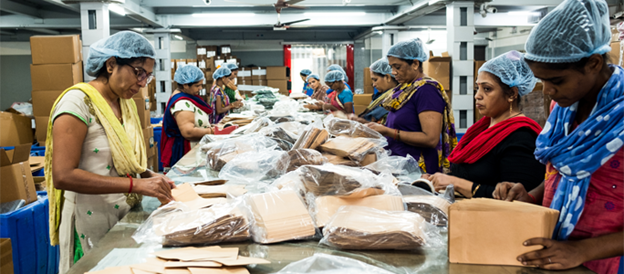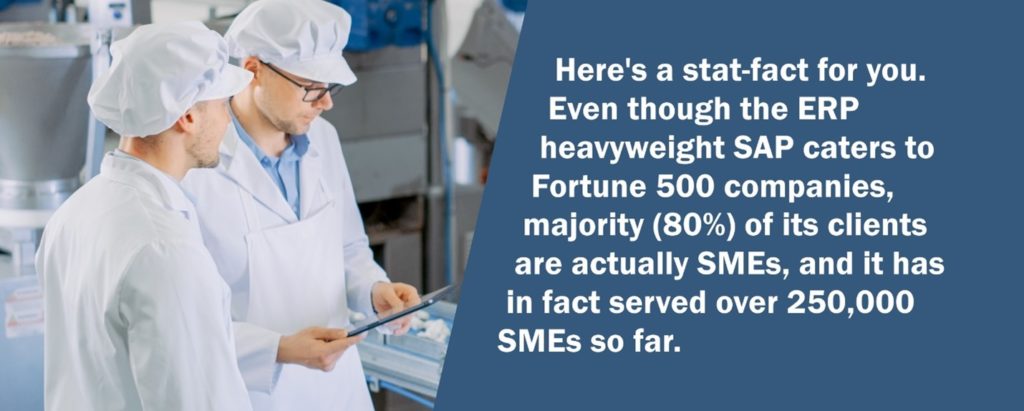
Enterprise Resource Planning software, or simply the ERP software, as we know, is an integrated business management tool that’s designed to manage and automate several complex business processes related to sales, purchase, inventory, finance, production, quality, compliance, customer support, etc.
There are many established ERP providers out there that offer cutting-edge ERP software solutions to different types of businesses across the globe.
While such systems have utility for all businesses, they are particularly useful for manufacturing— especially process manufacturing — businesses.
Among other things, ERP systems allow business organizations to analyze market trends better, take quick & timely decisions, and operate at optimum productivity levels.
No wonder an ERP software is beneficial in many ways for organizations of all types and sizes.
Yes, you read that right- all sizes!
It’s a popular misconception that ERP software are only used by large-sized businesses. There was a time when such systems were only used by big organizations.
But it was long back. Nowadays ERP software are most-commonly used by Micro, Small and Medium Enterprise (MSMEs) in India, and around the world, to streamline their business processes and to manage data from one centralized system.
This change has predominantly happened because small and medium businesses have over the time realized that an ERP system helps them conduct their business operations smoothly.
Such businesses have perennially struggled to handle both front-office as well as back-office operations efficiently at the same time, and have often relied on a single resource shouldering multiple roles due to the limited resources.

And, ERP software for MSMEs help such businesses automate tasks, improve the efficiency of their processes, make strategic decisions, keep pace with the technological advancements, streamline all operations, and delegate tasks smartly, thus enabling them to do more with less.
Needs of MSMEs are no different than that of large businesses
The challenges, as well as the requirements of process manufacturing MSMEs (yes, we’ll be focusing only on process manufacturing businesses) are no different than that of their larger counterparts.
They need to follow the regulatory mandates, meet reporting requirements, as well as quality parameters, keep costs under check, and stay audit-ready, among other things.
In addition, they need to get faster and sharper than the competition, standardize their processes, and make best use of the resources in order to realize the full potential of their market.
A process manufacturing ERP software helps them with all of this, and a lot more. In fact, more and more manufacturing MSMEs in India are fast getting aware of the benefits of this long-term investment.
The MSMEs can use an ERP software as a management tool, a customer-relationship-building tool, a quality management tool, an employee productivity tool, and more.
Through this blog, let’s take an in-depth look at some of the major reasons why a process manufacturing ERP software is required in MSMEs in India.
To handle risks better:
Small & medium businesses can significantly reduce risks with an ERP software for MSMEs. By automating the tasks, ERP systems bring down the chances of errors.
Besides, such systems help make reliable and accurate predictions, which gives businesses an advantage when it comes to forecasting and avoiding possible risks.
To boost employee interaction:
By integrating all the different processes, and bringing all the different business functions under one roof, an ERP software enhances employee coordination.
It creates a foundation for seamless interaction between employees over the various ongoing projects.
By fostering direct, online communication between them, it also reduces the need for physical presence, and helps save resources.
To forecast demand and supply:
An ERP system helps MSMEs accurately predict demand and supply.
It makes forecasting future demand possible by a blend of analysis of historical sales data, knowledge of market as well as seasonal trends, study of consumer behavior and buying patterns, etc.
Accurate forecasting comes in handy for setting prices and for making orders.
To manage resources better:
MSMEs in India need an ERP software to manage their limited resources efficiently.
Having man-power deployed to manage unproductive tasks such as vendor management, product/material info, etc. manually, small businesses run risk of breeding unproductivity.
An ERP system automates tasks, helps store, integrate, and make available vital data of all departments, and enables managing resources better.
To avoid supply chain losses:
Small businesses can’t afford to go out of stock and lose business from their limited clientele. Neither can they be in a state of over-stocking, and bearing extra cost of inventory and warehousing.
An ERP system, with its inventory management functionality, helps them maintain an optimum level of inventory, and keep a tab of material stock lists so as to know when to buy the materials.
To track production and manage order capacity:
Often the small businesses, particularly the process manufacturing ones, find it difficult to track the exact amount of supplies being used and product being produced.
An ERP software for process manufacturing, which keeps a strict check on production by storing the exact formulas and production recipe, is of great help in this regard.
It can also manage the size of production batches according to the changing demands.
To meet compliance regulations:
MSMEs, especially from the process manufacturing industry sectors such as paint, food, pharma, chemicals, and cosmetics manufacturing, find it hard to manage regulatory compliance manually.
But an ERP software for process manufacturing looks after all the compliance-related requirements, including technical, legal and corporate, and makes it easier for their product to pass any inspection or test.
To manage quality of the products:
Managing quality is a major headache for small and medium process manufacturing businesses.
However, a process manufacturing ERP software allows them to create, store, and set QC tests at every step of the value chain- i.e., when the materials come into the facility, when they are used for production, and when the goods are shipped. By managing the records of these tests, businesses can ensure quality at all stages.
To ensure security and quality of data:
Some ERP systems, particularly the Cloud-based ERP solutions, offer very tight security to the company’s data through their different features such as access controls, digital signatures, time-stamped audit trails, etc., among others.
These functionalities help ensure the completeness, accuracy, consistency, integrity, and security of data and records by providing a single input system for the process.
Concluding thought
Over the years, ERP systems have proved that they bring immense value to the table for a company of any type and size.
If you have read this far, then you’ll probably agree that MSMEs in India, and around the globe, get benefitted by an ERP software as it optimizes their resources, and helps deliver best products, maintain quality, and ensure continued business success.
BatchMaster caters to the needs of small- and medium-sized process manufacturing firms with its wide range of ERP software for process manufacturing industries.
You may particularly want to have a look at our Cloud and WEB ERP offerings that are popular with small businesses due to the tremendous value they offer at affordable prices.





